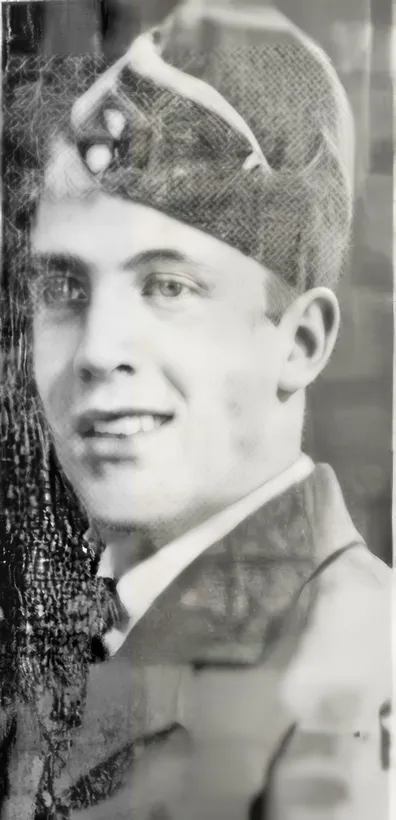KEENE Lloyd Ernest Keene December 9, 1918 - December 31 2007 In his 90th year, Lloyd passed away quietly with his family at his side shortly before midnight New Years Eve. Lloyd was born the second of seven children to Alexander and Olive Keene in Bearberry Alberta, where the family lived for a short time before moving to Merritt B.C. After a short stay in Merritt they relocated to White Rock in 1924.
Lloyd's schooling was completed almost entirely in Blaine Washington, where he graduated in 1936. Lloyd worked for the Post Office and Union Steamship Company in Sechelt prior to volunteering and being accepted into the RCAF in 1940.
After obtaining his wings and completing his training, he was sent overseas as a Pilot Officer first to England, then through the Mediterranean to Egypt and India and into south-east Asia, eventually being captured by Japanese forces in Java and imprisoned in Japan for 3-1/2 years until the war ended.
Lloyd returned home via San Francisco to Vancouver, much to the joy and relief of his family who had been unaware of his survival until only shortly before his arrival back home. After being released from the Military, Lloyd spent time in Yellowknife working with Whelan Insurance. It was here that he met his future wife Marjorie. Married in Edmonton, they moved to Victoria where their first of three sons was born. After a brief period of logging around Vancouver Island, and with Northern Construction in the Vancouver watershed, Lloyd was hired by the Government Telephone Company, moving to 150 Mile House where he worked as a repeater technician until 1960. It was while they were living here that their other two sons were born. The family then moved to Williams Lake where Lloyd continued his career with the B.C. Telephone Company, transferring to Dawson Creek in 1966 and retiring there in 1978. The same year, Lloyd and Marj left Dawson Creek to begin many happy years of retirement in their home on the South Thompson River near Kamloops, and moving to Chase in 2005.
Dad's interests ranged from his love of flying to farming and woodworking. Many examples of his handy work can be found in homes throughout the country.Lloyd was predeceased by his parents Alex and Olive, brothers John and Norman. He is survived by his wife of 60 years, Marjorie; two sisters; two brothers; sisters-in-law; three sons; and daughter-in law; nine grandchildren; six great grandchildren. Thanks Dad, for the fine example you set for us and the many valuable life lessons that you taught us over the years. We are all lucky to have you now as our Guardian Angel to watch over us. The family would like to thank the following for the wonderful care Dad has received. You are all a credit to your professions and your community; the Chase Medical Clinic, the Chase Health Center, the Chase and Kamloops Ambulance Services and the staff at Royal Inland Hospital. Friends are invited to a Memorial Service on Saturday, January 12, at 2:00 p.m. in the Schoening Funeral Chapel, Kamloops with Canon Jack Phelps officiating. Should friends desire, donations to the Royal Inland Hospital Foundation, 311 Columbia Street, Kamloops, B.C. V2C 2T1 or the Parkinson's Society of B.C., 600 890 W. Pender Street, Vancouver, B.C. V6C 1J9 would be gratefully appreciated in memory of Lloyd. On-line condolences may be expressed at www.schoenings.com Arrangements entrusted to Schoening Funeral Service, Kamloops, B.C. Telephone (250) 374-1454 Published in Vancouver Sun and/or The Province on Jan. 5, 2008

